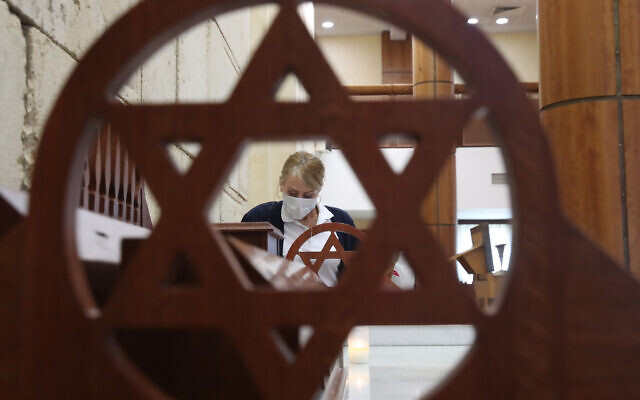Shuls may require pre-booking and allocated seating in post-lockdown world
Congregants face the prospect of having to reserve their seats theatre-style when synagogues reopen as part of plans to contain the threat of the virus post-lockdown.
Synagogue attendance could soon require theatre-style pre-booking and allocated seating under a post-lockdown scenario painted by the United Synagogue.
Guidance issued to shuls by the US leadership team this week envisages far less worshippers attending more services once places of worship are allowed to reopen, which is still at least one month away.
Chief Rabbi Ephraim Mirvis has said the community’s “priorities” are weddings and stone-settings, but that wider synagogue service modifications were being considered, with “no singing” in shul except from the service leader.
The deadly virus is spread through droplets in the air, so the US said worshippers should feel no pressure to attend, such as to make up a minyan, adding that shuls will need to implement rigorous cleaning, social distancing and safety precautions such as mandatory face masks.
Children under the age of 12 will not be allowed in, youth programming will remain suspended, and attendees will be seated two metres apart, with a sign-posted one-way system managing the flow within the building. Separate entrances and exits as well as good ventilation will also be required.
The UK’s largest synagogue body, the US said it was still consulting on whether to take the temperature of attendees before they enter the building, and that it was still investigating the “benefits and drawbacks” of air-conditioning units.
There will be restrictions on worshippers bringing religious texts from home and those handling the Sefer Torah or any ritual item will be required to wear gloves.
“Communities should consider starting to run weekday minyanim only, to rehearse the new system before moving to Shabbat services,” said the joint authors of the 12-page guidance document, which has been compiled by rabbis and medics together with US trustees and chairs.
The government has said that the reopening of places of worship should be a “cautious, phased process” over many months but community leaders are concerned about possible security challenges, such as long socially-distances queues outside shul buildings as checks are made at entrances.
On Sunday Mirvis said “the one consistent theme at present is uncertainty,” adding that the “unique nature of each shul” will dictate when and how it reopens.
The advice, acknowledged as “broad in scope,” was sent out by the organisation’s president Michael Goldstein, communities and strategy director Jo Grose, and rabbinical council chair Rabbi Nicky Liss. “There is no doubt that this first version has not addressed all questions, scenarios or considerations,” they said.
Shuls were urged to consider “limiting the time that people are together indoors” and “allowing for staggered services to meet demand,” while specific suggestions were made with a view to the High Holy Days in three months’ time.
On Rosh Hashanah this year, shofar blowing will only take place on the second day given the first day falls on Shabbat, with worshippers only needing to hear 30 notes of the instrument.
“Communities could consider holding a shofar blowing in the local park on condition that it does not cause a disturbance,” the authors say, adding that testing the shofar blower for coronavirus before the event is being considered.

Thank you for helping to make Jewish News the leading source of news and opinion for the UK Jewish community. Today we're asking for your invaluable help to continue putting our community first in everything we do.
For as little as £5 a month you can help sustain the vital work we do in celebrating and standing up for Jewish life in Britain.
Jewish News holds our community together and keeps us connected. Like a synagogue, it’s where people turn to feel part of something bigger. It also proudly shows the rest of Britain the vibrancy and rich culture of modern Jewish life.
You can make a quick and easy one-off or monthly contribution of £5, £10, £20 or any other sum you’re comfortable with.
100% of your donation will help us continue celebrating our community, in all its dynamic diversity...
Engaging
Being a community platform means so much more than producing a newspaper and website. One of our proudest roles is media partnering with our invaluable charities to amplify the outstanding work they do to help us all.
Celebrating
There’s no shortage of oys in the world but Jewish News takes every opportunity to celebrate the joys too, through projects like Night of Heroes, 40 Under 40 and other compelling countdowns that make the community kvell with pride.
Pioneering
In the first collaboration between media outlets from different faiths, Jewish News worked with British Muslim TV and Church Times to produce a list of young activists leading the way on interfaith understanding.
Campaigning
Royal Mail issued a stamp honouring Holocaust hero Sir Nicholas Winton after a Jewish News campaign attracted more than 100,000 backers. Jewish Newsalso produces special editions of the paper highlighting pressing issues including mental health and Holocaust remembrance.
Easy access
In an age when news is readily accessible, Jewish News provides high-quality content free online and offline, removing any financial barriers to connecting people.
Voice of our community to wider society
The Jewish News team regularly appears on TV, radio and on the pages of the national press to comment on stories about the Jewish community. Easy access to the paper on the streets of London also means Jewish News provides an invaluable window into the community for the country at large.
We hope you agree all this is worth preserving.






















